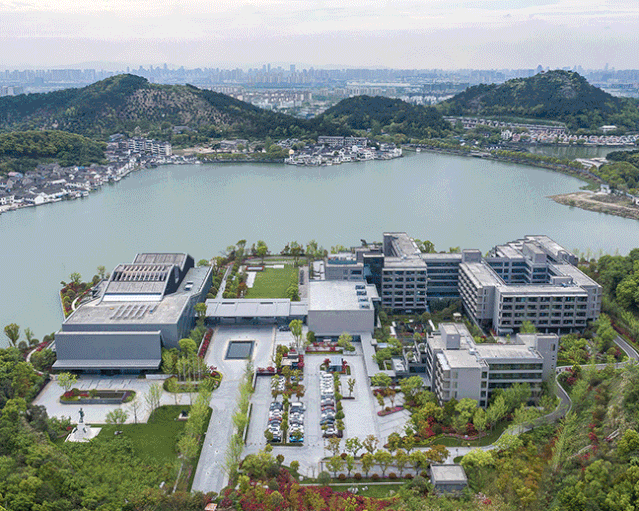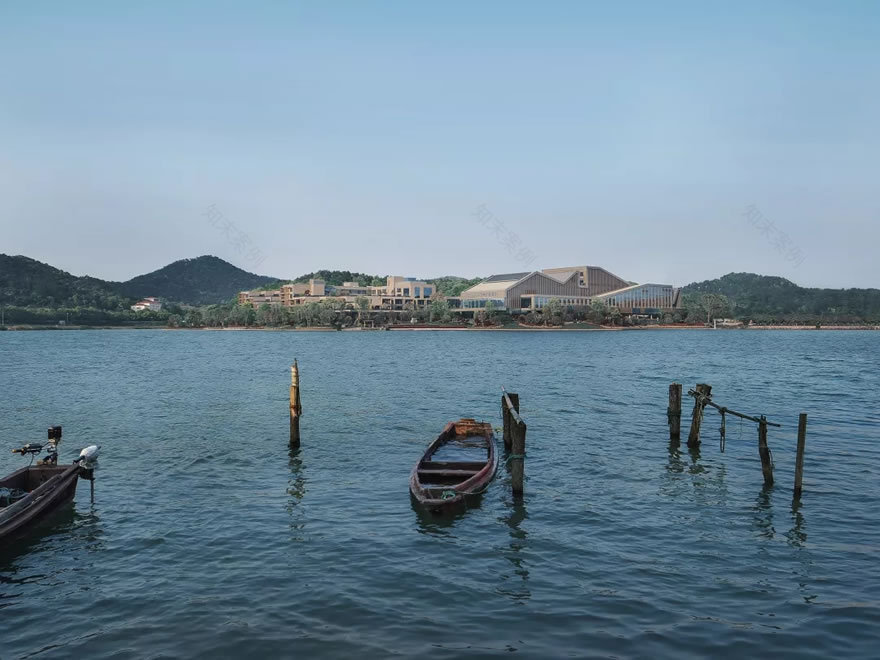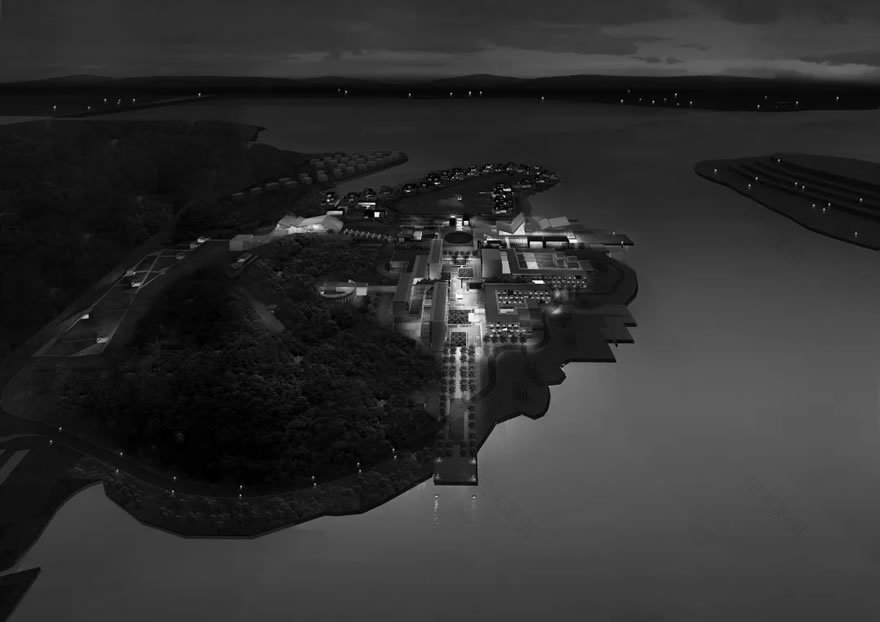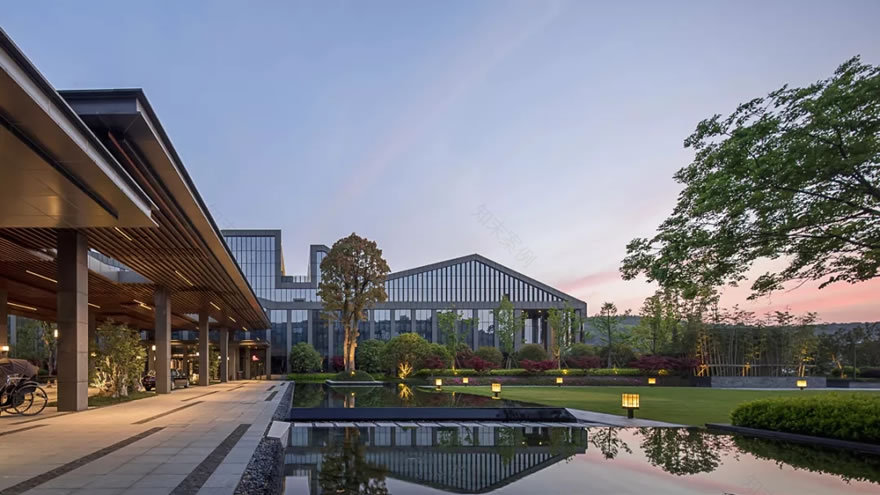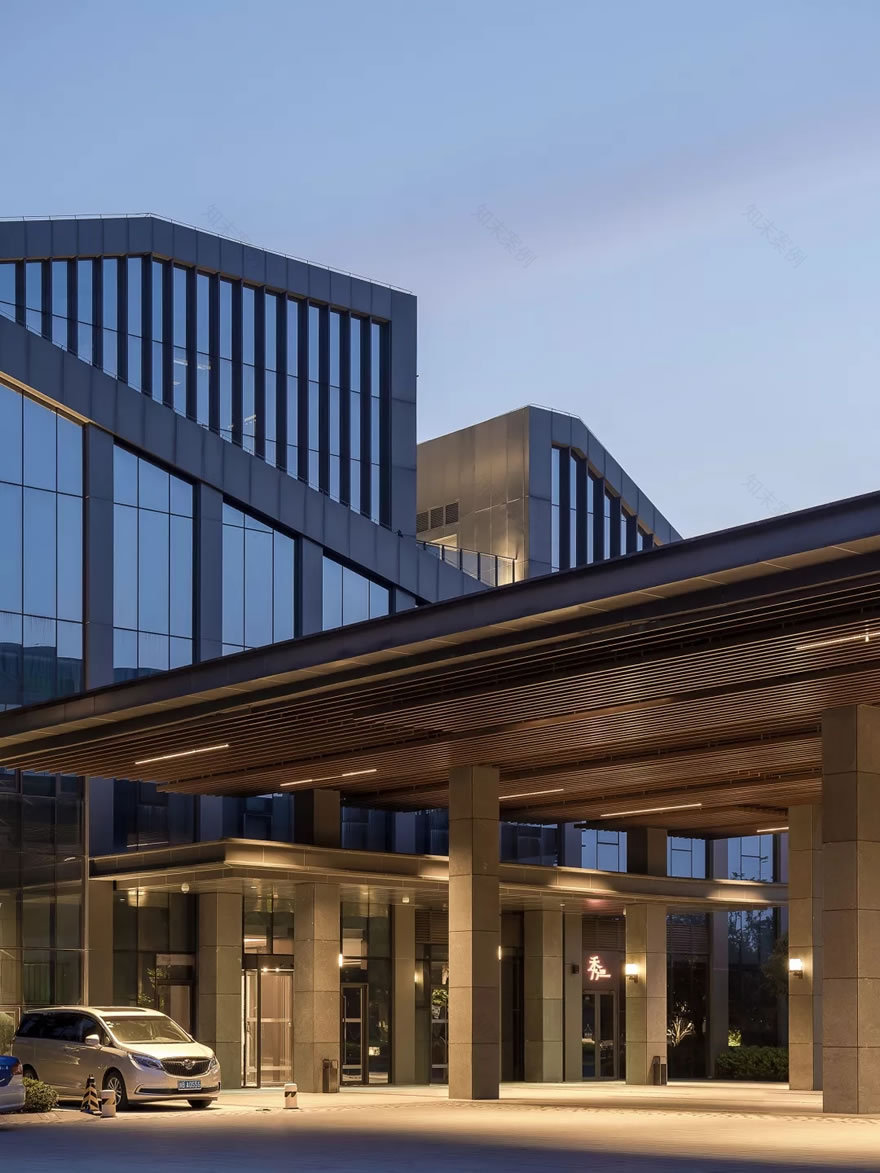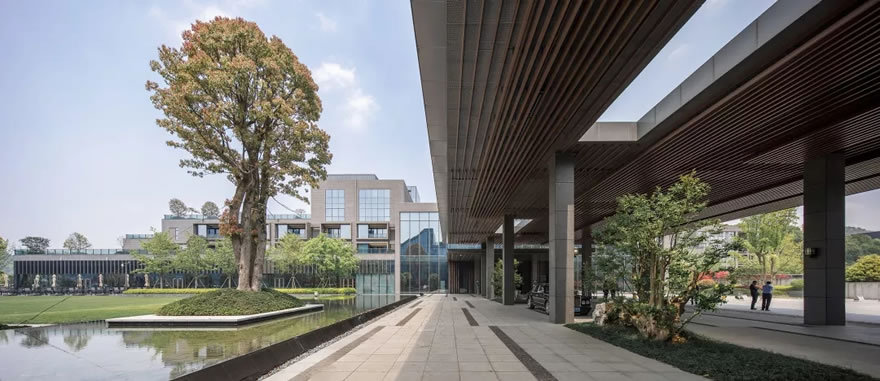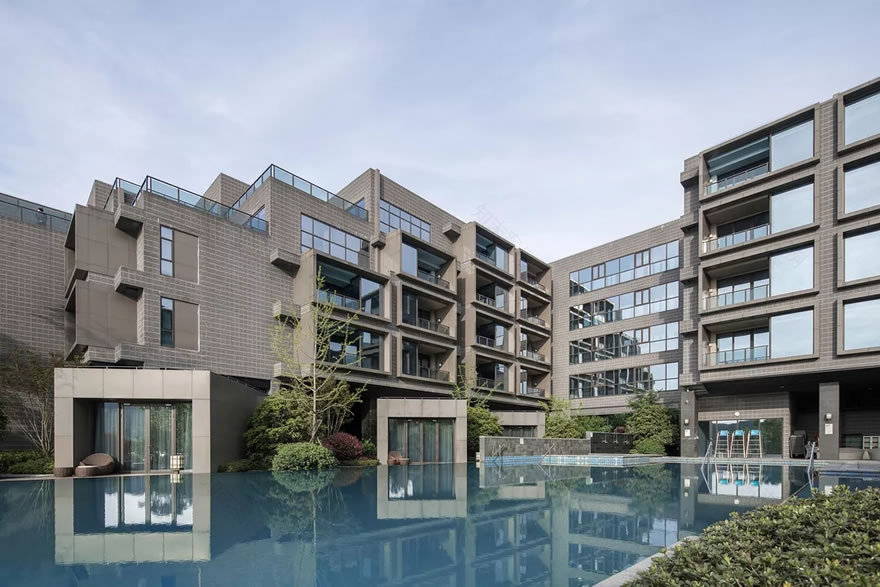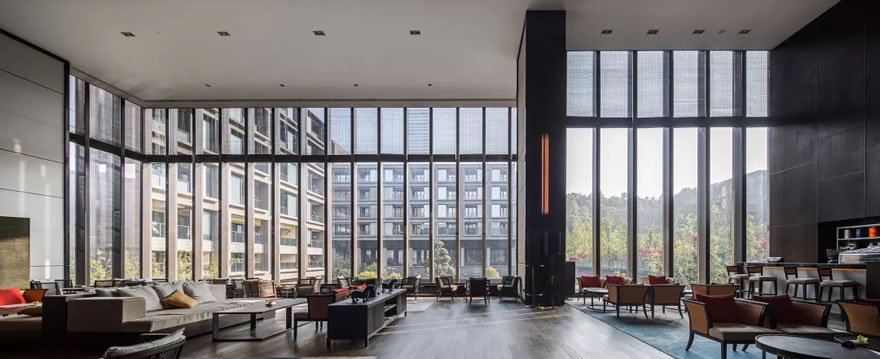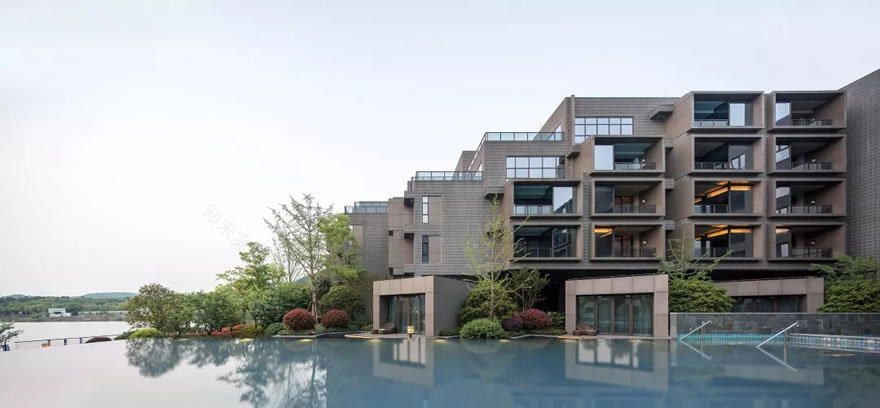查看完整案例


收藏

下载
项目名称:宁波东钱湖华茂希尔顿度假酒店及会议中心
项目地点:浙江宁波
项目业主:宁波华茂教育文化投资有限公司
用地面积:72088 ㎡
建筑面积:84864.15 ㎡
设计/建成时间:2009 / 2016.10
基地对岸的明代古村殷湾村
Yinwan Village, built in Ming Dynasty, across the water
东钱湖水域辽阔,围绕水脉建设的水乡古村落成为具有江南特色的风景。雾起的时候,山水隐入烟雨中,基地对岸的明代古村殷湾村在水面若隐若现,建筑与自然融合成为一个整体。这种江南园林的气质在宁波东钱湖华茂希尔顿度假酒店及会议中心的设计中得到保留。
Along the coastline of the vast Dongqian Lake, manifold ancient villages were built, composing a unique Jiangnan landscape. When foggy, the old Yinwan Village on the other side of the lake looms over water, and the architecture and the nature fuses into a whole.The design of Hilton Ningbo Dongqian Lake Resort and Conference Center seeks to preserve this kind of Jiangnan Garden Character.
现代 · 乡土
Modern · Local
©TANGHUA ARCHITECT&ASSOCIATES
平整的基地三面环山,一面临水。设计在山水之间创造了一组富有韵律感的院落,用人工痕迹雕琢自然风光。两条主轴构成场地规划的二元主体:水景观主轴从门前山山顶起指向东钱湖,以江南园林片段形式展开,是图底反转、几何化后的江南园林景观。人文轴线由会议中心和露天剧场组成,其建筑及空间序列以中国传统书院的形式展开。
The flat site, facing water, is surrounded by mountains on three sides. The design creates a rhythmic group of courtyards, which decorates natural surroundings with artifacts. The two main axes constitute the binary subject of the site planning: the water landscape main axis points from the peak of the Menqian Mountain to the Dongqian Lake, and is presented in the form of Jiangnan garden fragments, reversed and geometrized. The humanity axis, taking the form of traditional Chinese academy in architectural and spatial sequence, consists of a conference center and an amphitheater.
会议中心
Conference Center
©TANGHUA ARCHITECT&ASSOCIATES
会议中心是一段截取的抽象化后的中国传统书院片段。中国传统书院的形制与尺度被沿用,而具体的建筑单体形态明确且连续,几何化的山形折板起伏回应基地周边的山势。轴线、柱廊、坡屋顶,均是对中国传统书院印象的再现。
The conference center is a fragment of the abstracted Chinese traditional academy that was intercepted. The shape and scale of traditional Chinese academies are used, and the specific architectural form is clear and continuous, and the geometric mountain-shaped flaps fluctuate in response to the mountains around the base. The axis, colonnade, and sloping roof are all reproductions of the impression of traditional Chinese academies.
©TANGHUA ARCHITECT&ASSOCIATES
会议中心及酒店区客人由论坛主入口进入,车辆在论坛入口广场处地面停车场处停靠后,客人步行进入酒店大堂、餐厅、会议中心等区域;车辆也可经由此处的两个地下停车库坡道进入地下停车库,客人再由地下车库的电(楼)梯等垂直交通系统进入各自区域。交通规划将后勤人员流线与客人流线分离,且将机动车全部限制在酒店及会议中心的前广场区,为酒店客人提供了一个安全、舒适的步行环境。
The guests enter the conference center and hotel from the main entrance. The vehicle stops at the ground parking lot at the entrance plaza and the guests may walk into the hotel lobby, restaurant, conference center and other areas. Vehicles may also pass through two ramps to enter the underground parking garage, while the guests enter the respective areas by vertical traffic systems such as elevators and stairs. The transportation plan separates the logistics staff path from the guest path and restricts the motor vehicle to the front square area of the hotel and conference center, providing a walking-friendly environment for hotel guests.
度假酒店
Hotel
©TANGHUA ARCHITECT&ASSOCIATES
酒店主体部分沿用了中国传统民居院落的概念,将沿湖的五星级酒店以院落的方式组织起来。酒店保留了江南建筑最重要的公共空间形式——院落,客房像一个个堆叠的“方盒子”,围绕院落层叠展开,或堆垒,或退让,或架空,强化建筑宜人的尺度感。层层跌落的建筑形态与周围山体相互呼应、映衬。几个院落之间,以及院落和中间景观带的水院之间,彼此相互联系、相互流通、相互渗透,形成流动的空间。
The design organizes the hotel space following the concept of the traditional Chinese residential courtyards. The hotel rooms are designed to be “square boxes”, stacked around the courtyard, some piled up, some retreat, some overhead, to enhance the sense of scale of the building. The architectural form of the hotel that falls in layers is an imitation and response to the surrounding mountains. The courtyards and the water courtyard on the middle of the landscape belt are connected to each other, to deliver a sense of flowing.
©TANGHUA ARCHITECT&ASSOCIATES
酒店的立面表达的是传统江南建筑中方格窗的概念:单格为窗,四格为阳台,九格为空中院落……在方格间不断变化、组合的过程中,具有中国传统韵律的立面形象显现出来。
The concept of the square windows in traditional Jiangnan architecture is expressed through the design of the hotel façade: A single grid is a window, four grids forms a balcony, and nine combining grids becomes a floating courtyard... During the process of constant changing and combining squares, a traditional Chinese architecture style facade is revealed.
©TANGHUA ARCHITECT&ASSOCIATES
中心绿地是以江南园林尺度展开的一段错落有致的水景院落。水院中有漂浮的岛屿与下沉的院落,彼此之间以曲桥或汀步连接。同时,水院通过底层架空与两侧酒店空间之间相互渗透,并在局部位置形成对湖景及山景的视线通廊。沿湖景观带延续场地内的庭院肌理,将湖岸线进行了整理,创造部分休憩空间、水滨剧场及伸入水中的亲水平台。在人工化的景观带中,我们植入了一些形态相对自然的自由体,试图在延续山体意味的同时,创造一种反差、对比的趣味。
The central greenbelt, taking the scale of Jiangnan Garden, is designed to be a water theme garden, with floating islands and sinking courtyards connected by Quqiao or Tingbu. The hotel stilt floor allows the garden to be extended to the space beneath and better interact with natural surroundings. The lakeshore landscape belt continues the courtyard texture, and is arranged to create rest space, a waterfront theater and a public platform that extends into the water. In the landscape belt, we have implanted some artificial installations with natural forms, intending to create a sense of contrast between nature and artifacts.
©TANGHUA ARCHITECT&ASSOCIATES
主持建筑师:汤桦
项目组:贾璇 刘柳 汪田浩 等
施工图单位:宁波市建筑设计研究院有限公司
室内设计单位:CCD香港郑中设计事务所
施工单位:宁波建工工程集团有限公司
建筑摄影:张超摄影工作室
原文编辑:戴琼 郑晨曦
客服
消息
收藏
下载
最近



